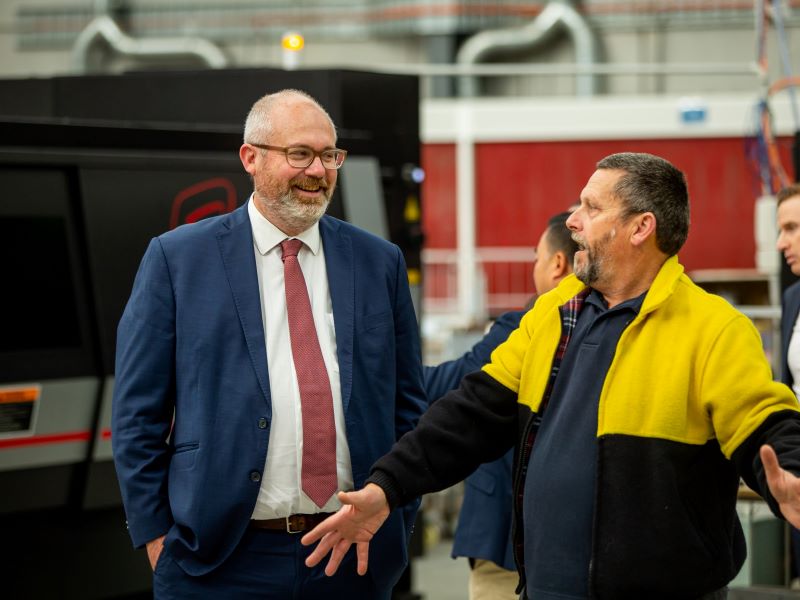Assistant manufacturing minister Tim Ayres will today issue a rallying cry to the Australian rail sector, as the new government’s domestic train manufacturing push leaves the station with a call for the first industry champion in a decade.
After repeated cost and time blowouts in foreign manufactured rail projects in New South Wales, Mr Ayres will launch a broadside at the former Berejiklian government in backing Labor’s new national approach to rail procurement.
He’ll argue there’s a common interest in more local content for everyone in the Australian rail supply chain through to the commuters and wider community, with more jobs, better policy outcomes and new industrial capability.
“Instead of Australia being at the end of global supply chains as a customer, I want to see Australian manufacturers in the global supply chains feeding products in — adding value and and making our exports more complex,” Mr Ayres told InnovationAus.com ahead of his address to the rail industry on Tuesday.

New South Wales will serve as a cautionary tale and getting its procurement approach “back on track” remains “first order business” for Mr Ayres, a New South Wales Senator who has carriage of Labor’s election promise to deliver a National Rail Manufacturing Plan
The New South Wales Liberal government has justified the use of international train manufacturers as a cheaper alternative, claiming local cost like materials, labour and energy add a 25 per cent premium to building trains onshore.
But McKell Institute analysis of six major transport procurement decisions made by the New South Wales Government found for four of them the alleged higher costs would have been offset by the broader economic benefits of awarding the major tenders to domestic firms.
The other two case studies found only a marginal up-front cost saving that “may be eroded when factoring in other costs such as delays and design flaws”.
The state government recent $2.8 billion international procurement of intercity trains has been plagued by delays, safety concerns and design flaws including the Korean-made trains being too wide for existing tunnels.
There have also been safety concerns surrounding the foreign made Sydney light rail fleet, which was pulled from operation last year after cracks were discovered in several trams.
The bungles are the “inevitable consequences” of the then-Premier Gladys Berejiklian and then-Transport minister Andrew Constance having “walked away” from local options to back long global supply chains and off shore processes, Mr Ayres said.
“They had no confidence in Australian manufacturing,” he told InnovationAus.com.
“In the Hunter Valley, in particular, they make some of the best trains in the world. They’ve got a high level of capability, a big reservoir of skilled tradespeople and engineers, and the government just walked away from the local industry.
“And they’ve paid a price in terms of costs, they’ve paid in terms of on-time delivery, they’ve paid in terms of quality and reliability. And they’ve paid a terrible price in terms of jobs and future capability.”
The Commonwealth does not buy rolling stock but has a place leading a national approach to procurement, according to Mr Ayres, who says “the benefits are enormous”.
“There are real benefits from cooperation, real benefits from collaboration, and it’s my job over the coming period to set out the advantages of that, to engage the states in a process of coordination ‘m putting a lot of stock in making sure that we get moving,” he said.
The new federal government has established a new Office of National Rail Industry Coordination to deliver Labor’s $14 million election promise of a National Rail Manufacturing Plan.
The plan includes a National Rail Procurement and Manufacturing Strategy, a new Rail Industry Innovation Council and a Rail Supplier Advocate to help manufacturers identify procurement and export opportunities.
Australia had a Rail Supplier Advocate under the Rudd government from 2009, but it was scrapped by the Abbot government in 2013.
The advocate’s job has traditionally been to help small and medium-sized enterprises access export and government supply opportunities. But Mr Ayres will also have them “making the case directly to the states about the advantages of local procurement” from next year.
Mr Ayres will officially launch the recruitment process for a Rail Supplier Advocate at the Australasian Railway Association’s annual conference in Brisbane on Tuesday.
The assistant minister, said he is looking for someone with energy and willing to “change the face of the industry”.
“I want this person to be a high profile, effective, credible advocate who’s an industry expert, who understands complex rail procurement processes, and can and can drive the local industry towards more local content,” he said.
Mr Ayres said the new government is well aware it too will need to work across traditional government silos of infrastructure, industry and procurement to get the most out of the new plan.
“It requires cooperation, not just across the Commonwealth government, and a sense of common vision. It also requires a sense of common vision across the states and territories and with industry. It’s actually in everybody’s interest to move this along in the right direction,” he said.
Do you know more? Contact James Riley via Email.

